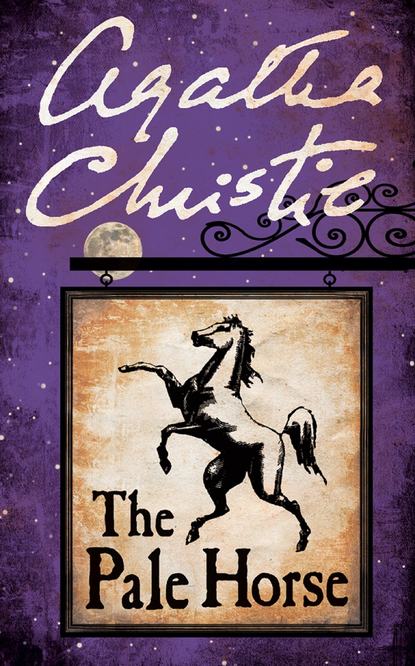По всем вопросам обращайтесь на: info@litportal.ru
(©) 2003-2025.
✖
The Pale Horse
Автор
Год написания книги
2019
Настройки чтения
Размер шрифта
Высота строк
Поля
‘How’s the Cockatoo getting on?’ I asked.
‘The Cockatoo?’ Mrs Oliver sounded at sea.
‘And the cricket ball?’
‘Really,’ said Mrs Oliver with dignity. ‘I think you must be mad or have a hangover or something. Pink Horses and cockatoos and cricket balls.’
She rang off.
I was still considering this second mention of the Pale Horse when my telephone rang again.
This time, it was Mr Soames White, a distinguished solicitor who rang up to remind me that under the will of my godmother, Lady Hesketh-Dubois, I was entitled to choose three of her pictures.
‘There is nothing outstandingly valuable, of course,’ said Mr Soames White in his defeatist melancholy tones. ‘But I understand that at some time you expressed admiration of some of the pictures to the deceased.’
‘She had some very charming water colours of Indian scenes,’ I said. ‘I believe you already have written to me about this matter, but I’m afraid it slipped my memory.’
‘Quite so,’ said Mr Soames White. ‘But probate has now been granted, and the executors, of whom I am one, are arranging for the sale of the effects of her London house. If you could go round to Ellesmere Square in the near future …’
‘I’ll go now,’ I said.
It seemed an unfavourable morning for work.
Carrying the three water colours of my choice under my arm, I emerged from Forty-nine Ellesmere Square and immediately cannoned into someone coming up the steps to the front door. I apologised, received apologies in return, and was just about to hail a passing taxi when something clicked in my mind and I turned sharply to ask:
‘Hallo—isn’t it Corrigan?’
‘It is—and—yes—you’re Mark Easterbrook!’
Jim Corrigan and I had been friends in our Oxford days—but it must have been fifteen years or more since we had last met.
‘Thought I knew you—but couldn’t place you for the moment,’ said Corrigan. ‘I read your articles now and again—and enjoy them, I must say.’
‘What about you? Have you gone in for research as you meant to do?’
Corrigan sighed.
‘Hardly. It’s an expensive job—if you want to strike out on your own. Unless you can find a tame millionaire, or a suggestible Trust.’
‘Liver flukes, wasn’t it?’
‘What a memory! No, I went off liver flukes. The properties of the secretions of the Mandarian glands; that’s my present-day interest. You wouldn’t have heard of them! Connected with the spleen. Apparently serving no purpose whatever!’
He spoke with a scientist’s enthusiasm.
‘What’s the big idea, then?’
‘Well,’ Corrigan sounded apologetic. ‘I have a theory that they may influence behaviour. To put it very crudely, they may act rather as the fluid in your car brakes does. No fluid—the brakes don’t act. In human beings, a deficiency in these secretions might—I only say might—make you a criminal.’
I whistled.
‘And what happens to Original Sin?’
‘What indeed?’ said Dr Corrigan. ‘The parsons wouldn’t like it, would they? I haven’t been able to interest anyone in my theory, unfortunately. So I’m a police surgeon, in N.W. division. Quite interesting. One sees a lot of criminal types. But I won’t bore you with shop—unless you’ll come and have some lunch with me?’
‘I’d like to. But you were going in there,’ I nodded towards the house behind Corrigan.
‘Not really,’ said Corrigan. ‘I was just going to gatecrash.’
‘There’s nobody there but a caretaker.’
‘So I imagined. But I wanted to find out something about the late Lady Hesketh-Dubois if I could.’
‘I dare say I can tell you more than a caretaker could. She was my godmother.’
‘Was she indeed? That’s a bit of luck. Where shall we go to feed? There’s a little place off Lowndes Square—not grand, but they do a special kind of sea food soup.’
We settled ourselves in the little restaurant—a cauldron of steaming soup was brought to us by a pale-faced lad in French sailor trousers.
‘Delicious,’ I said, sampling the soup. ‘Now then, Corrigan, what do you want to know about the old lady? And incidentally, why?’
‘Why’s rather a long story,’ said my friend. ‘First tell me what kind of an old lady she was?’
I considered.
‘She was an old-fashioned type,’ I said. ‘Victorian. Widow of an ex-Governor of some obscure island. She was rich and liked her comfort. Went abroad in the winters to Estoril and places like that. Her house is hideous, full of Victorian furniture and the worst and most ornate kind of Victorian silver. She had no children, but kept a couple of fairly well-behaved poodles whom she loved dearly. She was opinionated and a staunch Conservative. Kindly, but autocratic. Very set in her ways. What more do you want to know?’
‘I’m not quite sure,’ said Corrigan. ‘Was she ever likely to have been blackmailed, would you say?’
‘Blackmailed?’ I asked in lively astonishment. ‘I can imagine nothing more unlikely. What is this all about?’
It was then I heard for the first time of the circumstances of Father Gorman’s murder.
I laid down my spoon and asked,
‘This list of names? Have you got it?’
‘Not the original. But I copied them out. Here you are.’
I took the paper he produced from his pocket and proceeded to study it.
‘Parkinson? I know two Parkinsons. Arthur who went into the Navy. Then there’s a Henry Parkinson in one of the Ministries. Ormerod—there’s a Major Ormerod in the Blues—Sandford—our old Rector when I was a boy was Sandford. Harmondsworth? No—Tuckerton—’ I paused. ‘Tuckerton … Not Thomasina Tuckerton, I suppose?’
Corrigan looked at me curiously.
‘Could be, for all I know. Who’s she and what does she do?’
‘Nothing now. Her death was in the paper about a week ago.’

















